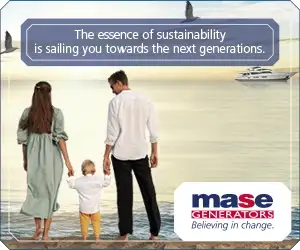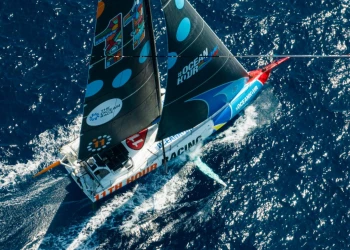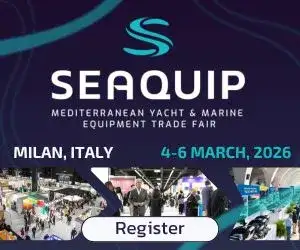
Fighting plastic pollution in Cabo Verde
11th Hour Racing Team and Biosfera to protect ecosystem in Atlantic
11th Hour Racing Team and Biosfera are joining forces to support the protection and preservation of the unique biodiversity of Cabo Verde. The organization, based in the West-African archipelago's Island of São Vicente, has been awarded a grant from the offshore sailing team as part of its commitment to legacy programs in each of the stopovers of The Ocean Race 2022-23.
The funding will support a 12-month-long project to fight the islands' severe pollution problem which is destroying the marine ecosystem. Combining a variety of in-the-field and educational activities, the project aims to heavily involve and mobilize the local communities to secure a safe and sustainable future for all species inhabiting the Islands, including humans.
"When racing around the world, we get to enjoy the ocean in its raw, unique beauty, which allows us to build a very special connection to it, " said 11th Hour Racing Team Skipper Charlie Enright (USA). "We also can see first hand how much the ocean and its marine life are suffering from human impact. Through our grantee program, we want to give something back to the waters that carry and sustain us and contribute towards the preservation and protection of the ocean. We always look to leave a positive footprint wherever we visit, which is why we choose to partner with local grassroots organizations and sustainability champions in each stopover of next year's round-the-world race."
Founded in 2006 by Tommy and José Melo, Biosfera's initial mission was to prevent the widely held practice of killing native animals, and the consumption of shearwater bird chicks or loggerhead turtle eggs, for food. The organization quickly realized that there was another, much bigger threat to their island's fragile ecosystem: the growing plastic pollution.
Leila Teixeira, who coordinates the Marine Pollution Department at Biosfera, explained: "There is so much trash on our shores that you can find birds' breeding nests completely made out of plastic debris, mostly fishing nets. A lot of wildlife perishes by getting entangled in these nets or ingesting small pieces of plastic. The quantity of trash we see here is overwhelming, but the bigger problem is actually what we cannot see," she commented. "If you have this much plastic on the beach, you have much more that floats in the water and accumulates on the ocean floor. As all of this plastic originally comes from the land, our main effort is to raise awareness of this issue amongst the local population and prevent the problem from growing even larger."
Due to Cabo Verde's exposed location in the Atlantic, marine debris from "literally all over the world," as Teixeira explained, gets washed up on its island shores. Part of the 11th Hour Racing Team grant will be used to organize clean-up campaigns and support a waste characterization study in order to allow the organization to understand what type of marine litter is present in these sites and to study the best ways of disposal.
"We quickly came to learn that when people understand the consequences of their actions, they are more likely to act in a way that helps our environment, rather than harm it. And so by working with schools and local businesses, acting as a mediator between nature and humans, we are fostering a positive exchange with the local community and in turn, they come onboard and join us as supporters and activists," said Teixeira.
As part of Biosfera's wider 'Marine Pollution Action Plan', the grant project with 11th Hour Racing Team also promotes a circular economy and seeks to provide employment to the islands' inhabitants. One example is the work they do with local women's groups to turn collected fishing nets into artisan objects for sale, such as produce bags and totes (find about the program with Simili Cabo Verde here).
Biosfera joins a global community of 11th Hour Racing Team grantees including Concarneau Marine Station (France), Plant A Million Coral Foundation (USA) and Explore (France). 11th Hour Racing Team Sustainability Program Manager Damian Foxall explained how the team's legacy grantees are chosen: "We work with organizations around the world committed to advancing innovative projects that improve ocean health and inspire change. The Team legacy grantees are all selected for their incredible work in their local community - a local solution to the global problem of the negative impact we humans have made to our ocean. We are all looking forward to visiting Biosfera in January next year on our stopover in The Ocean Race."
More legacy grantees for The Ocean Race 2022-23 will be announced in the upcoming weeks.





